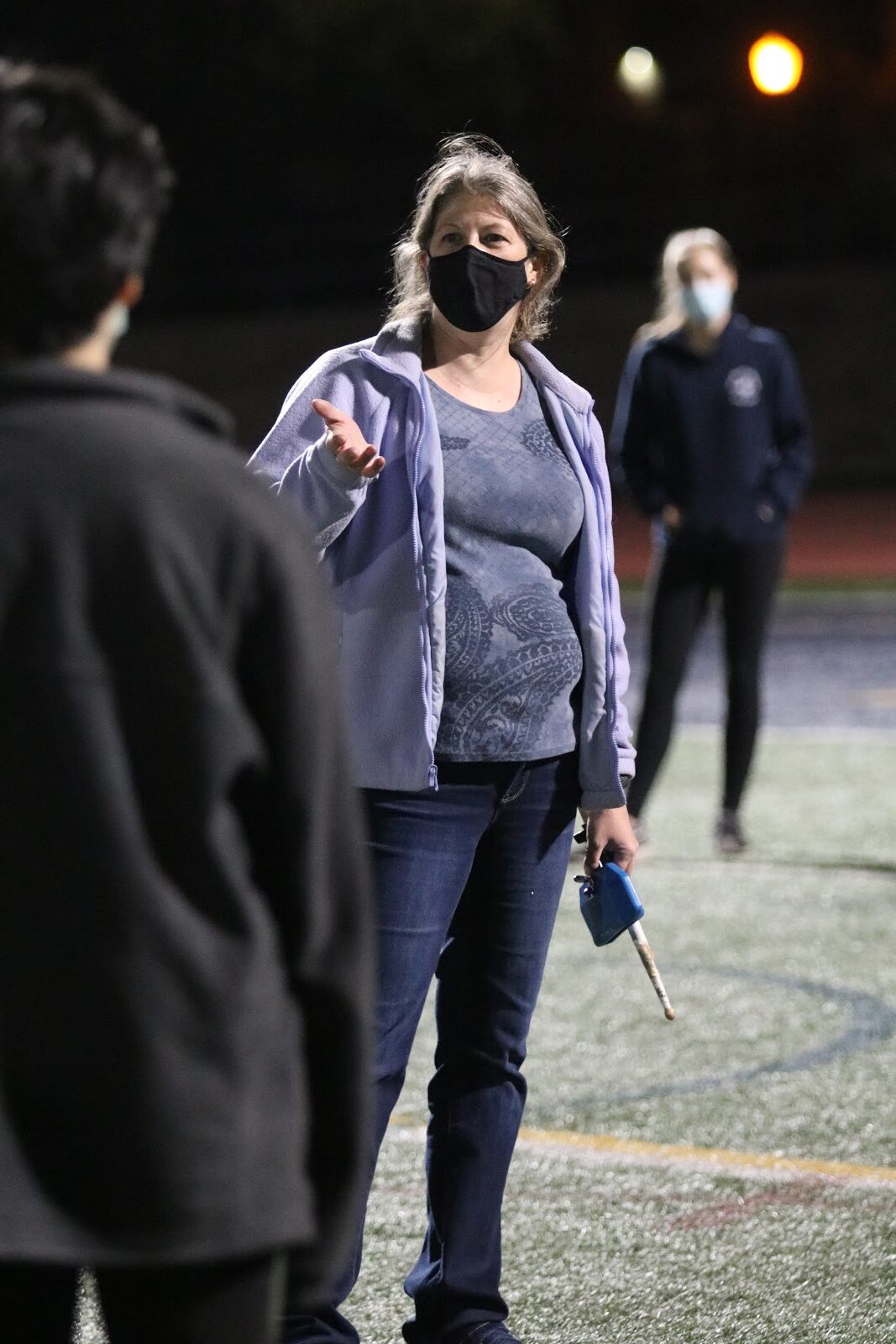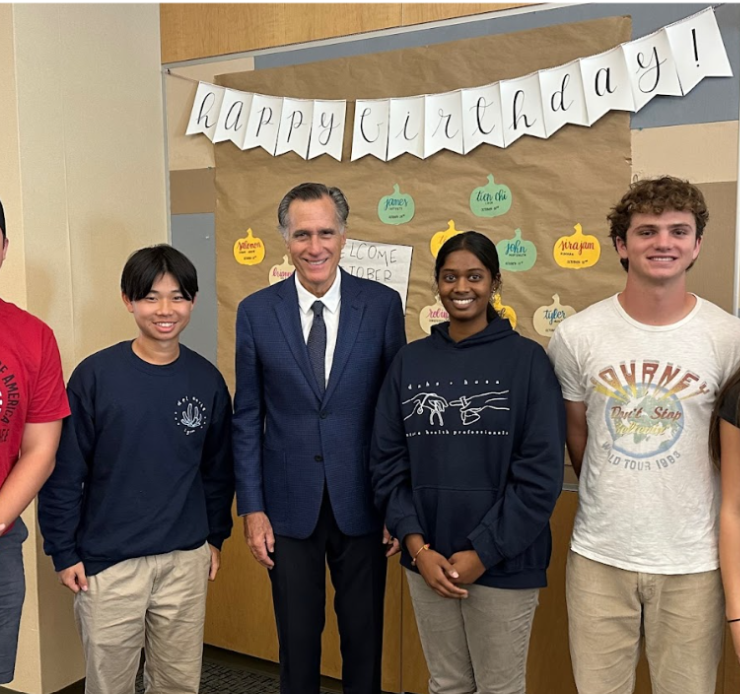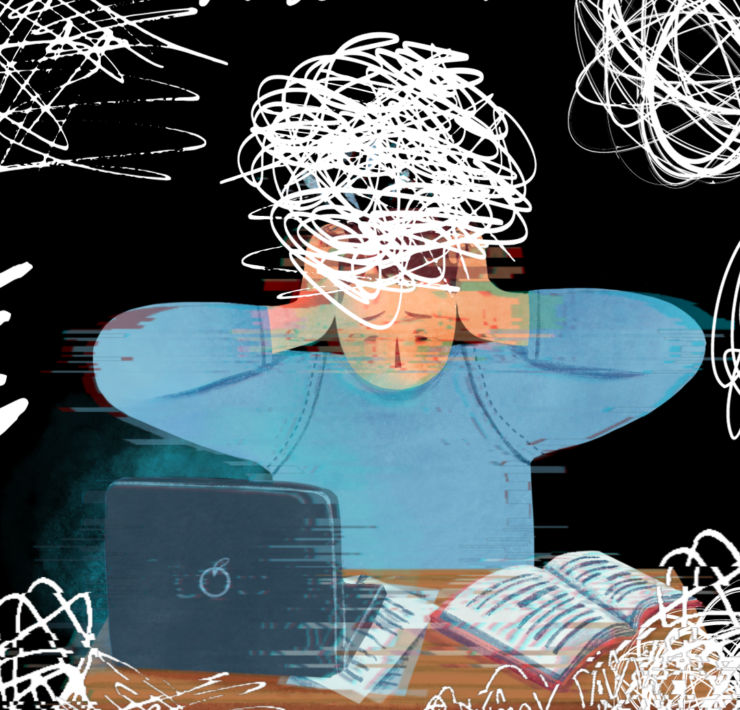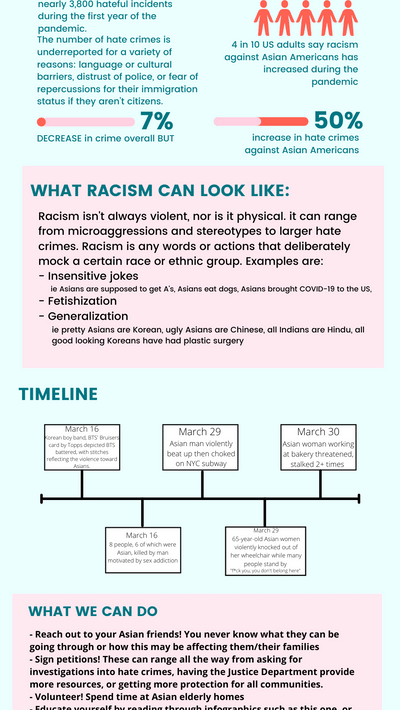Marching Season Begins and Ends During Pandemic

As the first trimester comes to a close, so does the marching band season. For the past several weeks, the Del Norte Marching Band has returned to campus for their traditional Monday night rehearsals, and November 16th marks the final segment of a turbulent, albeit successful season.
At 6 p.m., the first of three groups arrives at the stadium. While the football and cheer teams are still practicing, marching students separate into their sections and occupy different corners of the track to stretch and warm up. Eventually they make their way onto the field, spreading out across the yard lines. Drill instructors weave between the rows of students and provide individualized instruction while maintaining social distancing. Of course, everyone is wearing a mask.
Each group of students spends roughly an hour at the stadium before the next sections arrive. Over the span of three hours, about eighty students come on and off the field to march, maintaining a 1-to-12 ratio between instructors and students.
“It’s kind of like a well-oiled machine at this point,” says band director Dr. Jennifer Kitelinger.
When schools were initially shut down in early March, Kitelinger wasn’t surprised. Moreover, she was prepared—although under the impression that classes would resume in May. In May, still deep in quarantine, she began to meet with different band and orchestra directors to discuss how marching bands would function over the summer. Kitelinger spoke with the school principal to decide the best-case, middle-ground and worst-case scenarios for the music program. “It was just so many meetings,” she recalls.
By the time it was possible for certain groups to return to campus, it was obvious to Kitelinger that the marching band would have the easiest time adjusting: “Because it’s outside, I can so easily space them out and keep us safe. I feel very comfortable knowing I can do that.”
Kitelinger explains that the objective of holding marching band rehearsals during COVID-19 is to give senior members a chance to return to the field, and to provide freshmen with the education that they need in order to be successful in their following years in the music program.
Saxophonist Karina Levinson (‘23) can already see the benefits of having a marching season for the freshmen. “It’s nice looking to the future [of the program] because now, out of this, the freshmen have the knowledge that [returning students] got last year,” she says. “For the future years, they can still pass it on.”
As for sophomores and juniors, Kitelinger states that the goal is to perfect marching technique: “We’re seeing the bad habits that have formed without marching, so [we’re] digging at the bad habits and fixing them—which isn’t a bad thing at all. There’s still a lot to learn.”
While the Del Norte Color Guard and drumline are able to rehearse their winter shows for now, the marching band has no upcoming performances. Their wind instruments pose a safety hazard, which means there is no playing taking place—only marching. For drum major Raaghav Thatte (‘21), not being able to play any music is the worst part of how the pandemic has affected the music program. Even then, he made the decision to return to in-person rehearsals—“Because I miss it,” he says with a laugh.
Despite the many restrictions and cancellations, the general consensus among students is that it feels good to be back on the field, where they can reunite with friends and help newcomers improve. Kitelinger feels that although students are bummed about not being able to play a show, they are still doing what needs to be done.
Trumpet section leader Megan Corrigan (‘21) believes that the band has adapted well to the changes. “This is the most normal we’re going to get with the pandemic,” she says. “I wish we could have our regular marching band where we get to have a field show, get our music and play together… but I think this is the best we’re going to get, and I think we did a pretty good job with it because we’re still on the field.”
Rishi Carlton (‘21) notes that, as a section leader, it was particularly rewarding to see the growth of students across all grade levels. Their improvement was impressive considering how little time they had during rehearsals: “We had…probably six hours on the field, or less. That’s insane that we made a ton of progress.”
For each round of students, Monday night ends with a drill down—a marching competition that determines who can march correctly as Kitelinger quickly shouts out different commands: “Forward, march! Left flank, march!” If a student is caught in an error, they are directed to the sidelines by a drill instructor. The purpose of a drill down, Kitelinger tells the group, is to develop skills that will aid students in a real marching show; they’re bound to mess up at some point, but how fast can they recover? To Carlton, the drill down is the “last hurrah” of the season. Students cheer each other on, commend each other for their efforts and applaud the last one standing.
“We haven’t done much, so it was nice to bring [the season] all together,” Carlton says.
At the end of the night, drum majors Thatte and Kiersten Russ (‘21) give one final address to their fellow band members. Congratulations are in order, not only for making it through an unorthodox season, but also for making the best out of difficult times. Finally, the two stand back-to-back, bring the students to attention and call out, “Band dismissed.” There’s sadness in it, but also pride.
Although there is no opportunity to put on a marching show later in the year, the hope is that a small pep band will be allowed at potential football games. “We’re hoping there’s something we can do,” says Kitelinger. Ultimately, she feels optimistic about the future of the music program in the face of COVID-19: “It was definitely hard to figure out what we were going to do, but I feel like we’re hitting our stride.”
Ida Mobini is a former staff writer for The Talon since its revival. They enjoy reading, writing, and playing music. They also contribute to Del Norte's literary magazine The Featherlist.
Allison is a former photographer for The Talon. She is an editor for the yearbook and is passionate about digital media.







